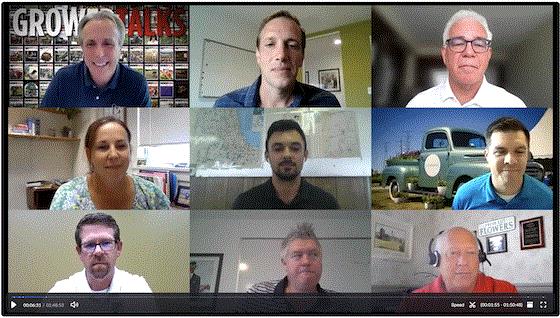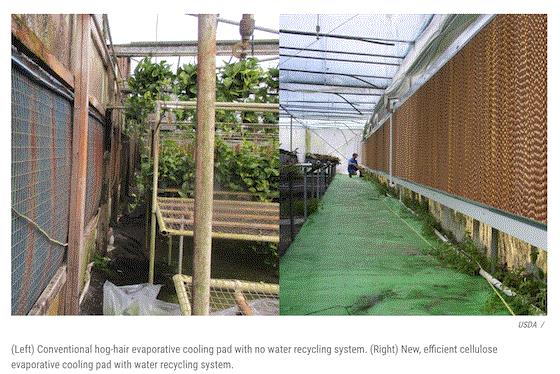In memoriam: Len Busch
An icon of the Minnesota floriculture world has passed away. Leonard S. “Len” Busch, founder of Len Busch Roses, died August 22 at the age of 90.
Len’s grandfather, Fred Busch, moved from Germany to Minneapolis in 1880 and started growing vegetables on Lyndale Avenue. In 1920, Fred’s three sons moved the business west to the town of Golden Valley, where Busch Brothers Greenhouse began growing flowers along with the vegetables. That's where young Len learned the business, working with his father, uncles and cousins. But he also attended Ohio State University, where he earned a degree in floriculture.
 In 1965, Len struck out on his own, moving to nearby Plymouth and building what would become Len Busch Roses. He started out growing pompons in a modest 28,000-sq. ft. greenhouse. It wasn’t until 1969 that he started growing roses. Today, the business is led by Len’s son and daughter-in-law Patrick and Diana, whose four children also play an active role in the business.
In 1965, Len struck out on his own, moving to nearby Plymouth and building what would become Len Busch Roses. He started out growing pompons in a modest 28,000-sq. ft. greenhouse. It wasn’t until 1969 that he started growing roses. Today, the business is led by Len’s son and daughter-in-law Patrick and Diana, whose four children also play an active role in the business.
Len is survived by his wife of 66 years, Marge; seven children; 21 grandchildren; 17 great-grandchildren; and his sisters Mary and Bernadine.
The ending of Len’s obituary will please many in our industry: it reads, “In lieu of memorials, flowers preferred.”
I suspect the church will be overflowing with friends and flowers!
Ball’s Will Healy, a Minnesota native and graduate and former professor at the University of Minnesota, knew Len and his business well. Said Will, “Len was a real innovator and great human who silently revolutionized the cut flower business in the U.S. I’ll never forget Abe Halevy [founder of the Department of Ornamental Horticulture at the Hebrew University in Jerusalem and a visiting professor at Michigan State and UC-Davis for many years] saying that Len was the best rose grower in the world! This was from THE best rose scientist in the world. Abe would come to Minnesota to learn from Len what the newest issues in rose growing were. Things we take for granted today were ideas and concepts that Len put into action. The industry was better for all that he did.”

More about Len from Will
I’m sure there are people who knew Len better than Will Healy did, but I don’t think you'll find anyone who respected Len more. Here’s a bit more about Len from Will:
“Len was game to try anything. In 1981, he was the first to pioneer soil cooling that allowed year-round flowering of freesia where he cooled the soil to induce the crops after they developed the critical leaf count. Today, it is a common practice. He tried soil cooling of alstroemeria and was the only alstroemeria grower in North America who had flowers when everyone else was out of production.
"His insights and work on fertilization, HPS lighting and CO2 addition, among other cultural techniques, were innovative at the time and are standard practices today. Wood boilers were just one of the ways he innovated to improve energy conservation. He was always concerned with how to be profitable by constantly reducing cost or improving productivity so that sales price never mattered, since he had lower costs than what he sold the crops for. If there was an idea to try, Len was the first to try it in the Upper Midwest.
“His most memorable quote was when he came to talk to my undergraduate class. He said, ‘Growing is like going to school: When you do 95% of the tasks 95% of the time and 90% time-on-time you produce a 93%—an A-quality product. But if you only do 90% of the tasks 60% of the time and 80% of the time on time, you produce a 76%—a C-quality crop.’ This instilled in me the need to make sure we know what we need to do and do it every time, on time, in order to be successful. In working with growers around the world, any time we experienced production problems, the growers invariable had failed to do the right thing, failed to do it on time or failed to do at the right time. Fixing one or more of these factors resulted in fixing the problem! Clearly, every grower can use this concept when figuring out how to produce high-quality products or live a productive life!
“I hope that this helps tell Len’s amazing life story and contributions he made to our industry. It is people like Len who quietly inspire and move our industry forward. Hopefully, he can inspire the next generation to the same level!”
Thanks, Will! Anyone else have memories or stories about Len Busch? Share them HERE.

Cut flower webinar recording available
If you missed our special webinar “Perennials for Cut Flowers” last week, you missed a barn-burner! Six speakers from five companies, plus two co-hosts, and me pushing the buttons—it looked like the Brady Bunch on Zoom! But the content was meatier than Alice’s beef stew, with Green Leaf Plants, GET Group, Benary, Darwin Perennials and Walters Gardens all sharing their best perennials for cutting, plus cultural tips for each.
They covered 26 different crops, including: Achillea, Agapanthus, Alchemilla, Astilbe, Baptisia, Clematis, Delphinium, Echinacea, Eryngium, Eucalyptus, Helleborus, Kniphofia, Lavandula, Leucanthemum, Liatris, Lupinus, Panicum, Pennisetum, Penstemon, Perovskia, Phlox, Rudbeckia, Scabiosa, Sedum, Solidago and Veronica.

Check it out HERE. A special thanks to our sponsor, Ball Seed.
Why cut perennials?
One highlight was hearing from Torben Hoffmeyer from GET Group, the young plant arm of Hoffie Nursersies in Union, Illinois. Torben explained that perennials offer a lot of options for cut flower growers, including a range of seasons (blooming in spring, summer, fall); flowers for accent (small) or focal point (large); a tremendous color palette; and species that will thrive in sunny or shady growing areas.
Other benefits of adding perennials to your cut flower field? Most of them are pollinator attractors! And they offer an excellent ROI, as they come back every year.
Interestingly, GET Group offers mixed flats of perennials for small- to medium-sized growers who are looking to try new products. Four varieties in one tray, 32 plants total. That means you can get as few as eight plants per variety. They’ve also got pre-mixed flats for those who want to leave the selecting to them. Learn more by contacting Colorlink or your Ball Seed rep or at ballseed.com/ballcolorlink.
Oh, I asked Torben what “GET Group” stands for. It’s Gretel, Emily and Torben—he and his two sisters. (I reckon dad thought if he named the company after them, they’d work for free!)

Sign up for our water molds webinar
Speaking of webinars, we’ve got one Wednesday, August 31, on a topic I’ve never done before, at least not specifically. It’s the notorious oomycetes (Oomycota), known as water molds. They're a group of pathogens that play a large role in the decomposition of plants and the breakdown of organic matter. And while that’s great for the great outdoors, it’s the last thing you want in your greenhouse or nursery crops!
In this webinar, BASF Technical Specialist Dr. Emma Lookabaugh will discuss how to look for symptoms of the oomycetes downy mildew, Phytophthora and Pythium, and give you tips for prevention and control measures to keep these notorious water molds from ruining your crops.
Sign up at www.growertalks.com/webinars.
Go ahead, talk to your plants!
Everybody else does … well, almost half of everybody else. www.Trees.com recently conduted a survey of 1,250 Americans to see how many admit to having conversations with plants or trees. As it turns out, 48% say they do. They also learned:
- 1 in 5 tree-talkers converse with their plants every day
- Two-thirds believe talking to their plants helps them grow
- 62% say talking to plants helps their mental health
- 23% have even admitted to kissing their plants
Jen Polanz, who found the item, said that, while she’s one of the plant-talkers, she draws the line at kissing them. I told her that when I mow the lawn, I give some of my trees a hearty thump—much like you would a big dog—to let ‘em know I appreciate their shade.
Read the rest of the item HERE.
UF’s online disease course starts September 19!
If you're looking for online education in horticulture, look no further than the University of Florida (for full transparency, my alma mater … but don’t hold it against them!).
UF will be offering a four-week course in disease management that will help improve your prevention and management of diseases in nurseries and greenhouses. This is the fourth course of the award-winning Greenhouse Online Training courses offered by UF’s Institute of Food and Agricultural Science (IFAS) Extension.
 This intermediate course is designed for growers with some experience and training. Topics covered will include how to differentiate between a disease and other issues, disease prevention tips, organic and conventional disease management options, and how to safely apply and handle fungicides. As a bonus, the course is offered in English and Spanish.
This intermediate course is designed for growers with some experience and training. Topics covered will include how to differentiate between a disease and other issues, disease prevention tips, organic and conventional disease management options, and how to safely apply and handle fungicides. As a bonus, the course is offered in English and Spanish.
To register, go to hort.ifas.ufl.edu/training.
Deadline extended for the IGOTY Awards
Good news for you dilly-dalliers and procrastinators: The deadline has been extended for the AIPH International Grower of the Year (IGOTY) Awards 2023. Growers of ornamental plants, flowers, trees and bulbs worldwide now have until Monday, October 10 to complete their entry. I mean, come on, you KNOW you want to prove you're as good as previous winners Sylva van Hulle, Hiller Nurseries, Bylands Nurseries, Sheridan Nursery, Schoneveld Breeding, Costa Farms, Ter Laak Orchids, Gediflora, Flores El Capiro, Anthura and Metrolina Greenhouses.
 This could be you, as happy as the Ter Laak Orchids crew.
This could be you, as happy as the Ter Laak Orchids crew.
The IGOTY Awards are organized by the International Association of Horticultural Producers (AIPH) and supported by Headline Partner Royal FloraHolland and Founding Partner FloraCulture International (sister publication to GrowerTalks). The awards celebrate best practices and recognizes the “best of the best” in ornamentals production. Along with the top “Rose Gold” prize, there are prizes in five categories: Finished Plants and Trees, Young Plants, Cut Flowers and Bulbs, Sustainability, and the most Inspiring Business.
Winners will be announced at an awards ceremony during IPM Essen in January 2023.
Learn more and enter online at www.aiph.org/events/igoty.

Bayer Environmental Science to sell and become Envu
Bayer’s Environmental Science Professional business will become Envu as a standalone company, contingent on the successful close of the acquisition of the business by private equity firm Cinven. That part of Bayer’s business, which is headquartered in Cary, North Carolina, includes all their non-agricultural products, including turf and ornamentals, forestry, vegetation management, and professional pest control. You recognize Bayer product names like Broadform, Alliette, Compass and Chipco (fungicides); Sevin, Altus and Kontos (insecticides); and Marengo (herbicide).
Pronounced “ehn-VIEW,” with the emphasis on the second syllable, the name is derived from “environment” and “vision,” they say, and was developed with input from both employees and customers around the world.
The new company, Envu plans to fully launch its new corporate identity upon the successful close, which is on track for later this year. Envu will also continue to collaborate with Bayer as a standalone company.
“As a trusted industry leader, we know that ensuring continued customer success requires strong partnerships and a renewed perspective,” said Gilles Galliou, president of the Environmental Science Professional business at Bayer and future CEO of the new standalone company. “That’s why Envu will be dedicated to bringing customers innovative solutions to help them push their business forward and tackle the toughest challenges our environments face today.”

Valent BioSciences announces significant R&D investments
It’s always good news when the providers of our plant protection products invest to make more and better ones, and that’s what Valent BoSciences LLC is up to. The subsidiary of Sumitomo Chemical of Tokyo has announced significant investments at several of its key research and development facilities aimed at increasing their innovations in biorational and biostimulant products.
A major expansion is planned for the Biorational Research Center in Libertyville, Illinois. Driven by business growth in synthetic biology, biostimulants, fermentation and downstream processing, the facility, which opened only four years ago, will be expanded significantly. The improvements will include new laboratory and pilot plant areas, office and meeting space, and an additional greenhouse.
Valent BioSciences’ subsidiary Mycorrhizal Applications has announced an expansion of its research facilities at the Bio Research & Development Growth Park at the Donald Danforth Plant Science Center in St. Louis, Missouri. The enhancements will provide increased laboratory capacity for in-vitro research related to arbuscular mycorrhizal fungi, as well as additional office and meeting space. Mycorrhizal Applications is also expanding the lab space at its headquarters in Grants Pass, Oregon, to increase overall research capacity.
Additionally, in late 2020, the company established a dedicated Biorational Unit at parent company Sumitomo Chemical Co., Ltd.’s Health & Crop Sciences Research Laboratory in Japan. The collaboration enables Valent BioSciences to broaden its biorational research programs and activities, as well as launch various synthetic biology projects that will spark new opportunities in the field.
Earlier this year, Valent BioSciences announced it's undertaking a major expansion at its Osage, Iowa, manufacturing facility. The additions include new production-scale fermentation and recovery equipment, a new pilot plant facility and expanded laboratory space.

Finally …
Breaking news! The very latest in water conservation technology has been approved for Florida greenhouses.
Called “evaporative cooling pads,” these groundbreaking devices “help conserve water by recirculating, reusing, recycling or redirecting water for another use.”

Hey, that’s what WQCS News, “NPR for the Treasure Coast,” reported on August 9 in THIS ITEM, and who am I to question an NPR reporter? (Actually, the program helps growers replace old hog-hair swamp coolers with more efficient corrugated cellulose cooling pads—which were developed back in the '70s, I believe.)
Feel free to email me at beytes@growertalks.com if you have ideas, comments or questions.
See you next time!

Chris Beytes
Editor
GrowerTalks and Green Profit
This e-mail received by 25,741 loyal readers!
Thanks to my loyal sponsors, who help me reach the 25,690 readers of Acres Online in more than 60 countries. Want to be one of them (a sponsor, that is)? Give Paul Black a shout and he'll hook you up.